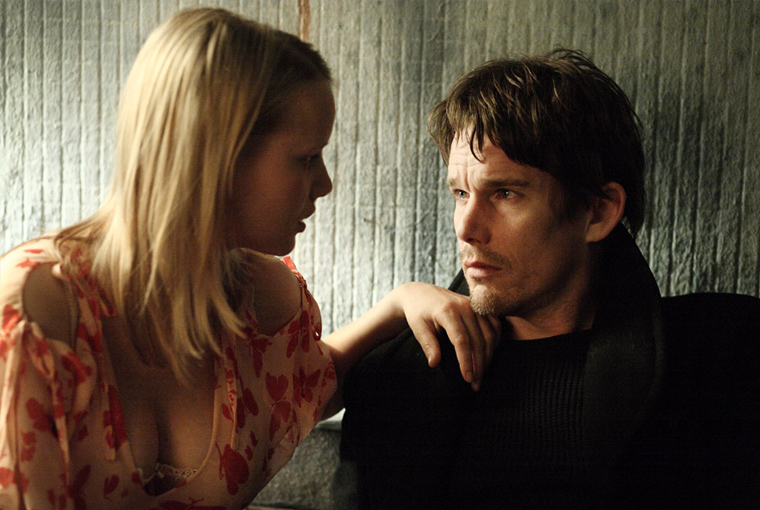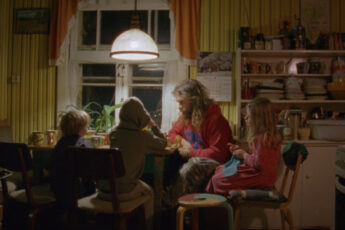Down and Out of His Mind in Paris
Paweł Pawlikowski’s The Woman in the Fifth (2011)
Vol. 39 (March 2014) by Julia Zelman
Introducing his study of emigré filmmakers in 1930s Paris, Alastair Phillips quotes Italo Calvino: “With cities, as it is with dreams, everything imaginable can be dreamed, but even the most unexpected dream is a rebus that conceals a desire or, its reverse, a fear.” Pawel Pawlikowski’s The Woman in the Fifth (2011) is certainly not the first director to create an alternate city that mimics the disintegration of the foreign protagonist. The city itself, or certain settings of it, becomes an inhuman double that mockingly reflects the protagonist’s inner state even while exacerbating his alienation. Roman Polanski’s The Tenant (1976) applies this treatment to a bourgeois apartment building in Paris; the timid Polish protagonist, played by Polanski, finds his double in a suicidal madwoman who inhabited his lodgings before being driven to death (he thinks) by her hostile neighbors. Polanski focuses on losing one’s grip on bodily identity, to the point where even one’s sex is distorted.
Pawlikowski’s The Woman in the Fifth has a more rarefied and intellectual approach to the deterioration of identity, but the same spiritual snares await his unstable immigrant protagonist, an American novelist named Tom Ricks. Our first image of Ricks is out of focus in the background of an over-the-shoulder shot of a customs officer. He explains that he is going to join his wife and help raise their daughter. In fact, Ricks’ wife has a restraining order against him, and his daughter thinks he’s in jail. Ricks introduces himself later as a novelist and a professor, yet he is obviously not teaching and has only written one novel. So this character is almost instantly defined, paradoxically, by his ambiguity and lies.
Robbed of all his possessions when he falls asleep on the bus, Ricks crash-lands in a singularly miserable hotel run by Monsieur Sezer and his underling/wife, a washed-out but sympathetic Pole. In order to pay his rent, he takes on a weird job from Sezer: he must lock himself in a windowless basement all night and man the front-door security camera for some mysterious, unsavory operation. In the meanwhile, he meets the titular Woman, played by the ubiquitous Kristin Scott Thomas: Margit Kadar, Romanian-French widow of a Hungarian writer, master of seven languages. This oddly maternal femme fatale washes Ricks in a bathtub after pleasuring him and assures him that, though he may feel like the “sad double” of his real self, he is really a “perfect” artist.
Ricks is a degraded American; Margit, a European mix. Sezer seems to be of Turkish origin; his wife Ania is Polish; Ricks’ neighbor in the horrible hotel is African. Pawlikowski’s film portrays Paris as a limbo for those who have shed their past and home, yet have not regained an identity. Like Polanski’s Tenant, Ricks is forced into a distorted role that, in the end, is closer to his true self than the facade he had tried to uphold. But unlike the Tenant who is victimized by xenophobes, he is surrounded by similarly unmoored people. If Polanski dwells on marginalization and self-disgust, Pawlikowski references the universal question of identity, here emphasized by the characters’ estrangement from any one culture. Is it a coincidence that Ricks longs for the happy world of his wife and daughter, who are French and living in Paris’ bourgeoisifying seventeenth arrondissement?
The relevance of this existential anguish, and its relationship to the characters’ secret penchant for violence, may be explained by a throwaway line uttered by a writer played by the real-life journalist and novelist Marcela Iacub. This exceedingly minor character explains to an inattentive Tom Ricks that she had published works under a South American dictatorship; in France, free of the secret police and the threat of prison and torture, she finds herself rather lost. “You don’t feel loved in a democracy,” she complains. Are the gruesome acts of violence in The Woman in the Fifth signs of love? Is Margit Tom’s muse, or his shadow torturer?




Leave a Comment